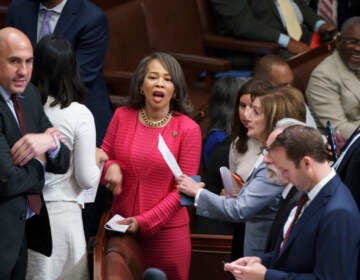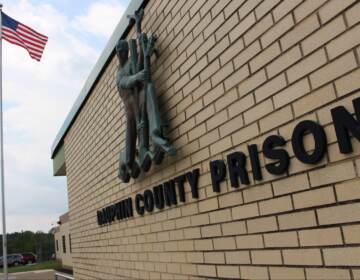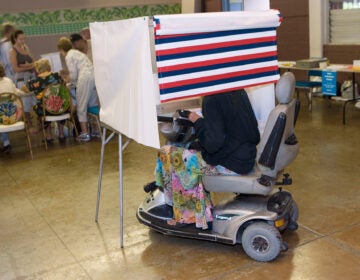Biden on voting rights passage: ‘I’m tired of being quiet!’
Some voting rights advocates planned to boycott the speech and instead spend the day working. “We’re beyond speeches. At this point, what we need ... is federal legislation."
President Joe Biden says that he supports changing Senate rules in order to pass voting rights legislation, declaring that changing the rules would be to protect the “heart and soul of our democracy.”
Biden told a crowd in Atlanta that he’d been having quiet conversations with Senators for months over the two bills up for debate, stalled because there aren’t enough Republican votes to move them past filibuster to votes.
“I’m tired of being quiet!” he said, emphatically pounding the podium. “I will not yield. I will not flinch,” in the effort to protect democracy.
Current rules require 60 votes to advance most legislation — a threshold that Senate Democrats can’t meet alone because they only have a 50-50 majority with Vice President Kamala Harris to break ties. Republicans unanimously oppose the voting rights measures.
Not all Democrats are on board with changing the filibuster rules. Conservative West Virginia Sen. Joe Manchin threw cold water on the idea Tuesday, saying he believes any changes should be made with substantial Republican buy-in.
And even if Democrats clear the obstacles to passage of the voting rights laws, it could be too late to counter widespread voting restrictions passed in 19 states following former President Donald Trump’s 2020 loss and his lies — embraced by many in the GOP — that the election was stolen through voter fraud.
THIS IS A BREAKING NEWS UPDATE. AP’s earlier story follows below.
ATLANTA (AP) — President Joe Biden will use a speech in Georgia to endorse changing Senate rules that have stalled voting rights legislation, saying it’s time to choose “democracy over autocracy.” But some civil rights groups won’t be there, in protest of what they say is administration inaction.
As he turns to his current challenge, Biden on Tuesday is also paying tribute to civil rights battles past — visiting Atlanta’s historic Ebenezer Baptist Church, where the late Rev. Martin Luther King Jr. once held forth from the pulpit. He also stood quietly as Martin Luther King III placed a wreath outside at the crypt of King and his wife, Coretta Scott King.
In remarks on the on the grounds of Morehouse College and Clark Atlanta University, Vice President Kamala Harris spoke before Biden Tuesday, warning that a barrage of laws making it tougher to vote means there is “a danger of becoming accustomed to these laws, a danger of adjusting to these laws as though they are normal.”
“There is nothing normal about a law that makes it illegal to pass out water or food to people standing in long voter laws,” she said, to cheers.
With Senate Majority Leader Chuck Schumer, D-N.Y., setting next Monday’s Martin Luther King Jr. Day as a deadline to either pass voting legislation or consider revising the rules around the chamber’s filibuster blocking device, Biden is expected to evoke the memories of the U.S. Capitol riot a year ago in more forcefully aligning himself with the voting rights effort.
Biden plans to tell his audience, “The next few days, when these bills come to a vote, will mark a turning point in this nation.”
“Will we choose democracy over autocracy, light over shadow, justice over injustice? I know where I stand. I will not yield. I will not flinch,” he’ll say, according to prepared remarks. “I will defend your right to vote and our democracy against all enemies foreign and domestic. And so the question is where will the institution of the United States Senate stand?”
Current rules require 60 votes to advance most legislation — a threshold that Senate Democrats can’t meet alone because they only have a 50-50 majority with Harris to break ties. Republicans unanimously oppose the voting rights measures.
Biden in the past has waded more cautiously into the debate. He is under enormous political pressure to engineer a breakthrough, though it’s not clear what practical effect he can have.
Underscoring that pressure, King said in a statement that he was pleased to meet with Biden but he also supported those who chose to skip the speech.
“We’ve seen what’s possible when President Biden uses the full weight of his office to deliver for bridges,” he said, referencing Biden’s successful push for a $1 trillion infrastructure spending deal. “And now we need to see him do the same for voting rights.”
Not all Democrats are on board with changing the filibuster rules. Conservative West Virginia Sen. Joe Manchin threw cold water on the idea Tuesday, saying he believes any changes should be made with substantial Republican buy-in.
And even if Democrats clear the obstacles to passage of the voting rights laws, it could be too late to counter widespread voting restrictions passed in 19 states following former President Donald Trump’s 2020 loss and his lies — embraced by many in the GOP — that the election was stolen through voter fraud.
Some voting rights advocates planned to boycott Biden’s speech. Georgia Democratic gubernatorial candidate Stacey Abrams, known for her untiring voting rights work, also was skipping the event. The White House, meanwhile, sent out an unusually long list of attendees for the speech. Aides said Abrams had a conflict but didn’t explain further, though she tweeted support for the president.
Biden said before his trip the two had a scheduling mix-up but had spoken and were “all on the same page.”
When asked what he was risking politically by speaking out when there aren’t enough votes to change the rules, he said: “I risk not saying what I believe. That’s what I risk. This is one of those defining moments. It really is. People are going to be judged on where were they before and where were they after the vote. History is going to judge us.”
Voting rights advocates in Georgia and nationwide are increasingly anxious about what may happen in 2022 and beyond. They view the changes in many states as a subtler form of ballot restrictions like literacy tests and poll taxes once used to disenfranchise Black voters, a key Democratic constituency.
“We’re beyond speeches. At this point, what we need, what we are demanding, is federal legislation,” said LaTosha Brown, co-founder of Black Votes Matter. And it can’t happen soon enough, she said.
Republicans who have fallen in line behind Trump’s election misinformation are separately promoting efforts to influence future elections by installing sympathetic leaders in local election posts and by backing for elective office some of those who participated in the riot at the U.S. Capitol a year ago.
Democratic Sen. Raphael Warnock of Georgia, who is senior pastor at Ebenezer Baptist and made history as the first Black senator elected in Georgia, said that “anything that can happen that will continue to shine a bright light on the urgency of this issue is important.”
White House press secretary Jen Psaki rejected some activists’ complaints that Biden hasn’t been a strong enough advocate.
“We understand the frustration by many advocates that this is not passed into law, yet. He would love to have signed this into law himself,” she said.
Georgia is at the center of it all, one of the key battleground states in the 2020 elections. After the votes were counted and recounted, Trump told a top state election official he wanted the official to “find” enough votes to overturn his loss. The state’s votes nonetheless went to Biden, and both of its Senate seats went to Democrats as well.
Last year, the Republican governor signed a sweeping rewrite of election rules that, among other things, gives the State Election Board new powers to intervene in county election offices and to remove and replace local election officials. That has led to concerns that the Republican-controlled state board could exert more influence over the administration of elections, including the certification of county results.
Congressional Democrats have written voting legislation that would usher in the biggest overhaul of U.S. elections in a generation by striking down hurdles to voting enacted in the name of election security, reducing the influence of big money in politics and limiting partisan influence over the drawing of congressional districts.
The package would create national election standards that would trump state-level GOP laws. It would also restore the ability of the Justice Department to police election laws in states with a history of discrimination.
WHYY is your source for fact-based, in-depth journalism and information. As a nonprofit organization, we rely on financial support from readers like you. Please give today.






